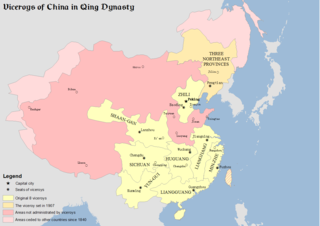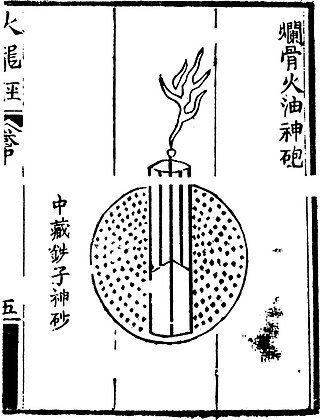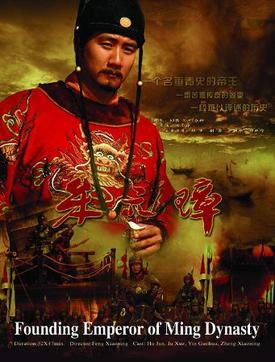Related Research Articles
Year 1355 (MCCCLV) was a common year starting on Thursday of the Julian calendar.
Year 1367 (MCCCLXVII) was a common year starting on Friday of the Julian calendar.

Hongwu Emperor, also known by his temple name as the Emperor Taizu of Ming (明太祖), personal name Zhu Yuanzhang, courtesy name Guorui, was the founding emperor of the Ming dynasty, reigning from 1368 to 1398.

Zongdu were the managers supervising provincial governors in Ming and Qing China. One viceroy usually administered several provinces and was in charge of all affairs of military, food, wages, rivers, and provincial governors within their region of jurisdiction. Viceroys was appointed by and directly reported to the Emperor.

The Heaven Sword and Dragon Saber, also translated as The Sword and the Knife, is a wuxia novel by Jin Yong and the third part of the Condor Trilogy, preceded by The Legend of the Condor Heroes and The Return of the Condor Heroes. It was first serialised from 6 July 1961 to 2 September 1963 in the Hong Kong newspaper Ming Pao.

The Red Turban Rebellions were uprisings against the Yuan dynasty between 1351 and 1368, eventually leading to its collapse. Remnants of the Yuan imperial court retreated northwards and is thereafter known as the Northern Yuan in historiography.

Chang Yuchun, courtesy name Boren and art name Yanheng, was a Chinese military general of the Ming dynasty. He was a follower of Zhu Yuanzhang, the founding emperor of the Ming dynasty, and contributed heavily to the establishment of the Ming Empire. He was famous for his bravery and formidable prowess in battle, which earned him the nickname of "Chang Hundred-Thousand" (常十万), because he alone was said to be as effective as a force of 100,000 troops.

Jiao Yu was a Chinese military general, philosopher, and writer of the Yuan dynasty and early Ming dynasty under Zhu Yuanzhang, who founded the dynasty and became known as the Hongwu Emperor. He was entrusted by Zhu as a leading artillery officer for the rebel army that overthrew the Mongol Yuan dynasty, and established the Ming dynasty.
Hu Weiyong was a Chinese official of the early Ming dynasty and a close adviser of the Hongwu Emperor. In the second half of the 1370s, he headed the civil administration of the empire. However, in 1380, he was accused of treason and executed. The subsequent purge cost the lives of tens of thousands of people.

Founding Emperor of Ming Dynasty is a Chinese television series based on the life of Zhu Yuanzhang, the founding emperor of the Ming dynasty. Directed by Feng Xiaoning and starring Hu Jun as the Hongwu emperor, the series was first aired on CCTV in China in 2006.

Chuanqi Huangdi Zhu Yuanzhang is a Chinese television series based on the life of Zhu Yuanzhang, the founding emperor of the Ming dynasty. Starring Chen Baoguo as the emperor, the series was first broadcast on CCTV in mainland China in 2006.

Empress Xiaocigao, commonly known as Empress Ma, was a Chinese empress consort of the Ming dynasty, married to the Hongwu Emperor and acting as his political adviser, exerting a large amount of influence during his reign.

Tang He, courtesy name Dingchen, was a significant character in the rebellion that ended the Yuan dynasty and was one of the founding generals of Ming dynasty. He came from the same village as Zhu Yuanzhang and joined Guo Zixing's Red Turban Rebellion, a millenarian sect related to the White Lotus Society, at the time of its original uprising, in March 1352. Tang was promoted quickly in rank as Guo's army grew. After conquering Jiqing City and Zhenjiang City, which was under the command of Zhu Yuanzhang, he was promoted to Yuan Shuai, and after conquering Changzhou in April 1357, Tang was placed in command there with the rank of deputy assistant chief of the commission of military affairs. In 1367, he was sent south to defeat Fang Guozhen's and Chen Youding's forces, and then campaigned in Shanxi, Gansu, and Ningxia under the command of Xu Da. He was granted the title Duke Xingguo. Tang He died in August 1395, one of the few founding generals of the Ming dynasty who had a natural death.

The Defense of Jingshi, also known as the Defense of Beijing, was a battle that took place between the Oirats and the Ming dynasty in 1449.
Longfeng was the era name (nianhao) of Han Lin'er, who was a rebel and emperor of Han Song (1355–1367) during the Yuan dynasty of China. It was used for a total of 12 years. After Han Lin'er's death, his subordinate Zhu Yuanzhang, Prince of Wu, changed the next year (1367) to "Wu 1", and in 1368, to "Hongwu", and established the Ming dynasty.
Han Lin'er was one of the leaders of the Red Turban Rebellion. From 1355, he was the emperor of the rebel Song dynasty. However, he only ruled the empire formally; his minister Liu Futong had the actual power. From 1363, he was only a puppet of Zhu Yuanzhang.
Fang Guozhen was a rebel leader in the late Yuan dynasty of China. He dominated the coast of Zhejiang and surrendered to Zhu Yuanzhang in 1367.
Li Siqi was a leader in the late Yuan dynasty of China. He controlled Shaanxi and surrendered to the Hongwu Emperor in 1369.
Liu Futong was a leader in the Red Turban Rebellion during the late Yuan dynasty of China. He had a major presence in northern China and was killed by Zhang Shicheng in 1363.
Ming Sheng was the second emperor of Ming Xia. His father, Ming Yuzhen, was a leader of the Red Turban Rebellions and the founder of Ming Xia, a dynasty located in Sichuan.
References
Citations
- ↑ Taylor 1975, p. 32-33.
- ↑ Taylor 1975, p. 2.
- 1 2 3 Mote & Twitchett 1988, pp. 62–63.
- ↑ Tsai 2011, p. 22.
- ↑ Theobald, Ulrich. "Ming Taizu 明太祖, the Hongwu Emperor 洪武". chinaknowledge.de.
- 1 2 3 Taylor 1975, pp. 32–33.
- 1 2 3 Mote & Twitchett 1988, pp. 45–48.
- ↑ Taylor 1975, pp. 32–35.
- 1 2 Taylor 1975, pp. 34–35.
- ↑ Mote & Twitchett 1988, pp. 68–69.
- ↑ Taylor 1975, p. 9.
Books
- Taylor, Romeyn (1975). Basic Annals of Ming T'ai-tsu. Chinese Material and Research Aids Service Center, Inc. ASIN B076VFSKS1.
- Mote, Frederick; Twitchett, Denis (1988). The Cambridge History of China Volume 7 The Ming Dynasty, 1368-1644, Part I. Cambridge University Press. ISBN 978-0-521-24332-2.
- Tsai, Shih-shan Henry (1 July 2011). Perpetual Happiness: The Ming Emperor Yongle. University of Washington Press. ISBN 978-0295800226.
Websites
- Theobald, Ulrich. "ChinaKnowledge.de". ChinaKnowledge.de.